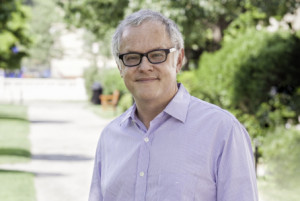
It has become compulsory for modern medical (or scientifically-relevant) shows to rely on a team of advisors and experts for maximal technical accuracy and verisimilitude on screen. Many of these shows have become so culturally embedded that they’ve changed people’s perceptions and influenced policy. Even the Gates Foundation has partnered with popular television shows to embed important storyline messages pertinent to public health, HIV prevention and infectious diseases. But this was not always the case. When Neal Baer joined ER as a young writer and simultaneous medical student, he became the first technical expert to be subsumed as an official part of a production team. His subsequent canon of work has reshaped the integration of socially relevant issues in television content, but has also ushered in an age of public health awareness in Hollywood, and outreach beyond it. Dr. Baer sat down with ScriptPhD to discuss how lessons from ER have fueled his public health efforts as a professor and founder of UCLA’s Global Media Center For Social Impact, including storytelling through public health metrics and leveraging digital technology for propelling action.
Neal Baer’s passion for social outreach and lending a voice to vulnerable and disadvantaged populations was embedded in his genetic code from a very young age. “My mother was a social activist from as long as I can remember. She worked for the ACLU for almost 45 years and she participated in and was arrested for the migrant workers’ grape boycott in the 60s. It had a true and deep impact on me that I saw her commitment to social justice. My father was a surgeon and was very committed to health care and healing. The two of them set my underlying drives and goals by their own example.” Indeed, his diverse interests and innate curiosity led Baer to study writing at Harvard and the American Film Institute and eventually, medicine at Harvard Medical School. Potentially presenting a professional dichotomy, it instead gave him the perfect niche — medical storytelling — that he parlayed into a critical role on the hit show ER.
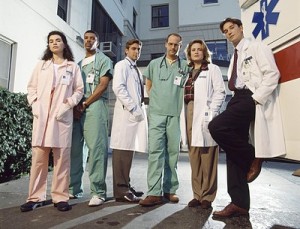
During his seven-year run as medical advisor and writer on ER, Baer helped usher the show to indisputable influence and critical acclaim. Through the narration of important, germane storylines and communication of health messages that educated and resonated with viewers, ER‘s authenticity caught the attention of the health care community and inspired many television successors. “It had a really profound impact on me, that people learn from television, and we should be as accurate as possible,” Baer reflects. “[Viewers] believe it’s real, because we’re trying to make it look as real as possible. We’re responsible, I think. We can’t just hide behind the façade of: it’s just entertainment.” As show runner of Law & Order: SVU, Baer spearheaded a storyline about rape kit backlogs in New York City that led to a real-life push to clear 17,000 backlogged kits and established a foundation that will help other major US cities do the same. With the help of the CDC and USC’s prestigious Norman Lear Center, Baer launched Hollywood, Health and Society, which has become an indispensable and inexhaustible source of expert information for entertainment industry professionals looking to incorporate health storylines into their projects. In 2013, Baer co-founded the Global Media Center For Media Impact at UCLA’s School of Public Health, with the aim of addressing public health issues through a combination of storytelling and traditional scientific metrics.
Soda Politics
One of Baer’s seminal accomplishments at the helm of the Global Media Center was convincing public health activist Marion Nestle to write the book Soda Politics: Taking on Big Soda (And Winning). Nestle has a long and storied career of food and social policy work, including the seminal book Food Politics. Baer first took note of the nutritional and health impact soda was having on children in his pediatrics practice. “I was just really intrigued by the story of soda, and the power that a product can have on billions of people, and make billions of dollars, where the product is something that one can easily live without,” he says. That story, as told in Soda Politics, is a powerful indictment on the deleterious contribution of soda to the United States’ obesity crisis, environmental damage and political exploitation of sugar producers, among others. More importantly, it’s an anthology of the history of dubious marketing strategies, insider lobbying power and subversive “goodwill” campaigns employed by Big Soda to broaden brand loyalty.
Even more than a public health cautionary tale, Soda Politics is a case study in the power of activism and persistent advocacy. According to a New York Times expose, the drop in soda consumption represents the “single biggest change in the American diet in the last decade.” Nestle meticulously details the exhaustive, persistent and unyielding efforts that have collectively chipped away at the Big Soda hegemony: highly successful soda taxes that have curbed consumption and obesity rates in Mexico, public health efforts to curb soda access in schools and in advertising that specifically targets young children, and emotion-based messaging that has increased public awareness of the deleterious effects of soda and shifted preference towards healthier options, notably water. And as soda companies are inevitably shifting advertising and sales strategy towards , as well as underdeveloped nations that lack access to clean water, the lessons outlined in the narrative of Soda Politics, which will soon be adapted into a documentary, can be implemented on a global scale.
ActionLab Initiative
Few technological advancements have had an impact on television consumption and creation like the evolution of digital transmedia and social networking. The (fast-crumbling) traditional model of television was linear: content was produced and broadcast by a select conglomerate of powerful broadcast networks, and somewhat less-powerful cable networks, for direct viewer consumption, measured by demographic ratings and advertising revenue. This model has been disrupted by web-based content streaming such as YouTube, Netflix, Hulu and Amazon, which, in conjunction with fractionated networks, will soon displace traditional TV watching altogether. At the same time, this shifting media landscape has burgeoned a powerful new dynamic among the public: engagement. On-demand content has not only broadened access to high-quality storytelling platforms, but also provides more diverse opportunities to tackle socially relevant issues. This is buoyed by the increased role of social media as an entertainment vector. It raises awareness of TV programs (and influences Hollywood content). But it also fosters intimate, influential and symbiotic conversation alongside the very content it promotes. Enter ActionLab.
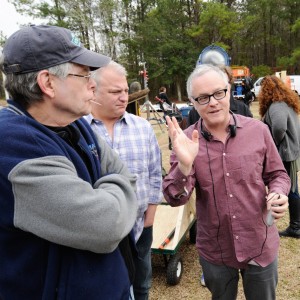
One of the critical pillars of the Global Media Center at UCLA, ActionLab hopes to bridge the gap between popular media and social change on topics of critical importance. People will often find inspiration from watching a show, reading a book or even an important public advertising campaign, and be compelled to action. However, they don’t have the resources to translate that desire for action into direct results. “We first designed ActionLab about five or six years ago, because I saw the power that the shows were having – people were inspired, but they just didn’t know what to do,” says Baer. “It’s like catching lightning in a bottle.” As a pilot program, the site will offer pragmatic, interactive steps that people can implement to change their lives, families and communities. ActionLab offers personalized campaigns centered around specific inspirational projects Baer has been involved in, such as the Soda Politics book, the If You Build It documentary and a collaboration with New York Times columnist Nicholas Kristof on his book/documentary A Path Appears. As the initiative expands, however, more entertainment and media content will be tailored towards specific issues, such as wellness, female empowerment in poor countries, eradicating poverty and community-building.
“We are story-driven animals. We collect our thoughts and our memories in story bites,” Baer notes. “We’re always going to be telling stories. We just have new tools with which to tell them and share them. And new tools where we can take the inspiration from them and ignite action.”
Baer joined ScriptPhD.com for an exclusive interview, where he discussed how his medical education and the wide-reaching impact of ER influenced his social activism, why he feels multi-media and cross-platform storytelling are critical for the future of entertainment, and his future endeavors in bridging creative platforms and social engagement.
ScriptPhD: Your path to entertainment is an unusual one – not too many Harvard Medical School graduates go on to produce and write for some of the most impactful television shows in entertainment history. Did you always have this dual interest in medicine and creative pursuits?
Neal Baer: I started out as a writer, and went to Harvard as a graduate student in sociology, [where] I started making documentary films because I wanted to make culture instead of studying it from the ivory tower. So, I got to take a documentary course, and it’s come full circle because my mentor Ed Pinchas made his last film called “One Cut, One Life” recently and I was a producer, before his demise from leukemia. That sent me to film school at the American Film Institute in Los Angeles as a directing fellow, which then sent me to write and direct an ABC after-school special called “Private Affairs” and to work on the show China Beach. I got cold feet [about the entertainment industry] and applied to medical school. I was always interested in medicine. My father was a surgeon, and I realized that a lot of the [television] work I was doing was medically oriented. So I went to Harvard Medical School thinking that I was going to become a pediatrician. Little did I know that my childhood friend John Wells, who had hired me on China Beach, would [also] hire me on “ER” by sending me the script, originally written by Michael Crichton in 1969, and dormant for 25 years until it was discovered in a trunk owned by Steven Spielberg. [Wells] asked me what I thought of the script and I said “It’s like my life only it’s outdated.” I gave him notes on how to update it, and I ultimately became one of the first doctor-writers on television with ER, which set that trend of having doctors on the show to bring verisimilitude.
SPhD: From the series launch in 1994 through 2000, you wrote 19 episodes and created the medical storylines for 150 episodes. This work ran parallel to your own medical education as a medical student, and subsequently an intern and resident. How did the two go hand in hand?
NB: I started writing on ER when I was still a fourth year medical student going back and forth to finish up at Harvard Medical School, and my internship at Children’s Hospital of Los Angeles over six years. And I was very passionate about bringing public health messages to the work that I was doing because I saw the impact that television can have on the audience, particularly the large numbers of people that were watching ER back then.
I was Noah Wylie’s character Dr. Carter. He was a third year [medical student], I was a fourth year. So I was a little bit ahead of him, and I was able to capture what it was like to be the low person on the totem pole and to reflect his struggles through many of the things my friends and I had gone through or were going through. Some of my favorite episodes we did were really drawn on things that actually happened. A friend of mine was sequestered away from the operating table but the surgeons were playing a game of world capitals. And she knew the capital of Zaire, when no one else did, so she was allowed to join the operating table [because of that]. So [we used] that same circumstance for Dr. Carter in an episode. Like you wouldn’t know those things, you had to live through them, and that was the freshness that ER brought. It wasn’t what you think doctors do or how they act but truly what goes on in real life, and a lot of that came from my experience.
SPhD: Do you feel like the storylines that you were creating for the show were germane both to things happening socially as well as reflective of the experience of a young doctor in that time period?
NB: Absolutely. We talked to opinion leaders, we had story nights with doctors, residents and nurses. I would talk to people like Donna Shalala, who was the head of the Department of Health and Human Safetey. I asked the then-head of the National Institutes of Health Harold Varmus, a Nobel Prize winner, “What topics should we do?” And he said “Teen alcohol abuse.” So that is when we had Emile Hirsch do a two-episode arc directly because of that advice. Donna Shalala suggested doing a story about elderly patients sharing perscriptions because they couldn’t afford them and the terrible outcomes that were happening. So we were really able to draw on opinion leaders and also what people were dealing with [at that time] in society: PPOs, all the new things that were happening with medical care in the country, and then on an individual basis, we were struggling with new genetics, new tests, we were the first show to have a lead character who was HIV-positive, and the triple cocktail therapy didn’t even come out until 1996. So we were able to be path-breaking in terms of digging into social issues that had medical relevance. We had seen that on other shows, but not to the extent that ER delved in.
SPhD: One of the legacies of a show like ER is how ahead of its time it was with many prescient storylines and issues that it tackled that are relevant to this very day. Are there any that you look back on that stand out to you in that regard as favorites?
NB: I really like the storyline we did with Julianna Margulies’s character [Nurse Carole Hathaway] when she opened up a clinic in the ER to deal with health issues that just weren’t being addressed, like cervical cancer in Southeast Asian populations and dealing with gaps in care that existed, particularly for poor people in this country, and they still do. Emergency rooms [treating people] is not the best way efficiently, economically or really humanely. It’s great to have good ERs, but that’s not where good preventative health care starts. The ethical dilemmas that we raised in an episode I wrote called “Who’s Happy Now?” involving George Clooney’s character [Dr. Doug Ross] treating a minor child who had advanced cystic fibrosis and wanted to be allowed to die. That issue has come up over and over again and there’s a very different view now about letting young people decide their own fate if they have the cognitive ability, as opposed to doing whatever their parents want done.
SPhD: You’ve had an Appointment at UCLA since 2013 at the Fielding School of Global Health as one of the co-founders of the Global Media Center for Social Impact, with extremely lofty ambitions at the intersection of entertainment, social outreach, technology and public health. Tell me a bit about that partnership and how you decided on an academic appointment at this time in your life.
NB: Well, I’m still doing TV. I just finished a three-year stint running the CBS series Under the Dome, which was a small-scale parable about global climate change. While I was doing that, I took this adjunct professorship at UCLA because I felt that there’s a lot we don’t know about how people take stories, learn them, use them, and I wanted to understand that more. I wanted to have a base to do more work in this area of understanding how storytelling can promote public health, both domestically and globally. Our mission at the Global Media Center for Social Impact (GMI) is to draw on both traditional storytelling modes like film, documentaries, music, and innovative or ‘new’ or transmedia approaches like Facebook, Twitter, Instagram, graphic novels and even cell phones to promote and tell stories that engage and inspire people and that can make a difference in their lives.
SPhD: One of the first major initiatives is a very important book “Soda Politics” by the public health food expert Dr. Marion Nestle. You were actually partially responsible for convincing her to write this book. Why this topic and why is it so critical right now?
NB: I went to Marion Nestle because I was convinced after having read a number of studies, particularly those by Kelly Brownell (who is now Dean of Public Policy at Duke University), that sugar-sweetened sodas are the number one contributor to childhood obesity. Just [recently], in the New York Times, they chronicled a new study that showed that obesity is still on the rise. That entails horrible costs, both emotionally and physically for individuals across this country. It’s very expensive to treat Type II diabetes, and it has terrible consequences – retinal blindness, kidney failure and heart disease. So, I was very concerned about this issue, seeing large numbers of kids coming into Children’s Hospital with Type II diabetes when I was a resident, which we had never seen before. I told Marion Nestle about my concerns because I know she’s always been an advocate for reducing the intake and consumption of soda, so I got [her] research funds from the Robert Wood Johnson Foundation. What’s really interesting is the data on soda consumption really aren’t readily available and you have to pay for it. The USDA used to provide it, but advocates for the soda industry pushed to not make that data easily available. I [also] helped design an e-book, with over 50 actionable steps that you can take to take soda out of the home, schools and community.
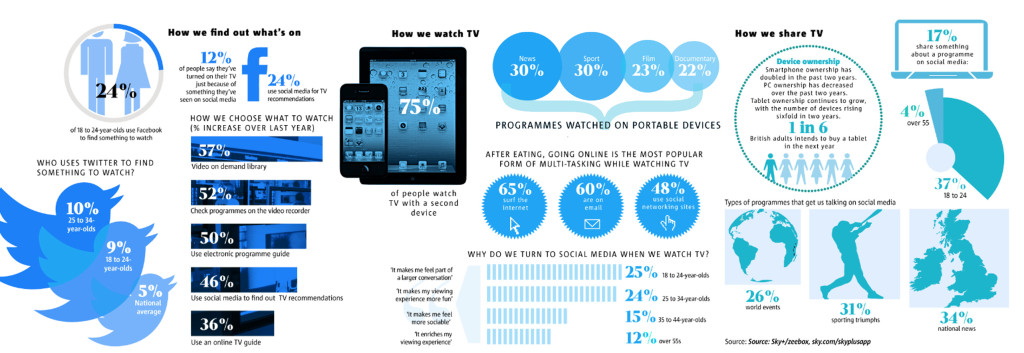
SPhD: How has social media engagement via our phones and computers, directly alongside television watching, changed the metric for viewing popularity, content development and key outreach issues that you’re tackling with your ActionLab initiative?
NB: ActionLab does what we weren’t [previously] able to do, because we have the web platforms now to direct people in multi-directional ways. When I first started on ER in 1994, television and media were uni-directional endeavors. We provided the content, and the viewer consumed it. Now, with Twitter [as an example], we’ve moved from a uni-directional to a multi-directional approach. People are responding, we are responding back to them as the content creators, they’re giving us ideas, they’re telling us what they like, what they don’t like, what works, what doesn’t. And it’s reshaping the content, so it’s this very dynamic process now that didn’t exist in the past. We were really sheltered from public opinion. Now, public opinion can drive what we do and we have to be very careful to put on some filters, because we can’t listen to every single thing that is said, of course. But we do look at what people are saying and we do connect with them in ways they never had access to us before.
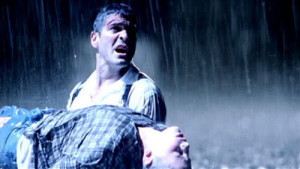
This multi-directional approach is not just actors and writers and directors discussing their work on social media, but it’s using all of the tools of the internet to build a new way of storytelling. Now, anyone can do their own shows and it’s very inexpensive. There are all kinds of YouTube shows on now that are watched by many people. It’s a kind of Wild West, where anything goes and I think that’s very exciting. It’s changed the whole world of how we consume media. I [wrote] an episode of ER 20 years ago with George Clooney, where he saved a young boy in a water tunnel, that was watched by 48 million people at once. One out of six Americans. That will never happen again. So, we had a different kind of impact. But now, the media landscape is fractured, and we don’t have anywhere near that kind of audience, and we never will again. It’s a much more democratic and open world than it used to be, and I don’t even think we know what the repercussions of that will be.
SPhD: If you had a wish list, what are some other issues or global obstacles that you’d love to see the entertainment world (and media) tackle more than they do?
NB: In terms of specifics, we really need to talk about civic engagement, and we need to tell stories about how [it] can change the world, not only in micro-ways, say like Habitat For Humanity or programs that make us feel better when we do something to help others, but in a macro policy-driven way, like asking how we are going to provide compulsory secondary education around the world, particularly for girls. How do we instate that? How do we take on child marriage and encourage countries, maybe even through economic boycotts, to raise the age of child marriage, a problem that we know places girls in terrible situations, often with no chance of ever making a good living, much less getting out of poverty. So, we need to think both macroly and microly in terms of our storytelling. We need to think about how to use the internet and crowdsourcing for public policy and social change. How can we amalgamate individuals to support [these issues]? We certainly have the tools now, with Facebook, Twitter and Instagram, and our friends and social networks, to spread the word – and a very good way to spread the word is through short stories.
SPhD: You’ve enjoyed a storied career, and achieved the pinnacle of success in two very competitive and difficult industries. What drives Dr. Neal Baer now, at this stage of your life?
NB: Well, I keep thinking about new and innovative ways to use trans media. How do I use graphic novels in Africa to tell the story of HIV and prevention? How do we use cell phones to tell very short stories that can motivate people to go and get tested? Innovative financing to pay for very expensive drugs around the world? So, I’m very much interested in how storytelling gets the word out, because stories don’t just change minds, they change hearts. Stories tickle our emotions in ways that I think we don’t fully understand yet. And I really want to learn more about that. I want to know about what I call the “epigenetics of storytelling.” I’m writing a book about that, looking into research that [uncovers] how stories actually change our brain and how do we use that knowledge to tell better stories.
Neal Baer, MD is a television writer and producer behind hit shows China Beach, ER, Law & Order SVU, Under The Dome, and others. He is a graduate of Harvard University Medical School and completed a pediatrics internship at Children’s Hospital Los Angeles. A former co-chair of USC’s Norman Lear Center Hollywood, Health and Society, Dr. Baer is the founder of the Global Media Center for Social Impact at the Fielding School of Global Health at UCLA.
*****************
ScriptPhD.com covers science and technology in entertainment, media and advertising. Hire our consulting company for creative content development. Follow us on Twitter and Facebook. Subscribe to our podcast on SoundCloud or iTunes.